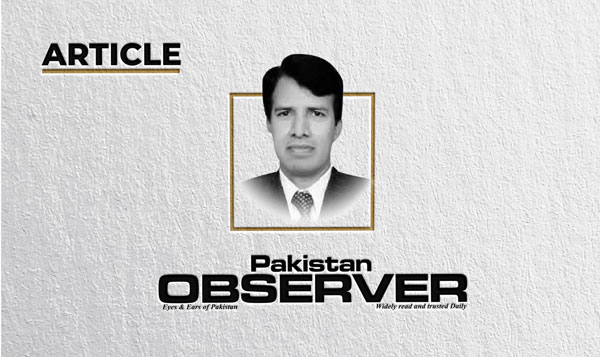Endangering the Indus Water Treaty-1960
BEING the upper riparian, India has always been manipulating the water of three western rivers, whose water is exclusively meant for Pakistan. In her latest move, India has demanded from Pakistan to re-negotiate the Indus Water Treaty-1960; a step towards the abrogation of the treaty, Prime Minister Modi had hinted on a number of occasions. In her latest official communiqué, India demanded Pakistan, “to enter into inter-governmental negotiations within 90 days to rectify the material breach of IWT. This process would also update IWT to incorporate the lessons learned over the last 62 years.” Indeed, New Delhi desire to amend IWT-1960 as per her desires. India has also asked the World Bank, the guarantor of IWT-1960 for the re-negotiation and modifications over the treaty. On its part, the World Bank has allowed two separate proceedings to address the concerns of both India and Pakistan. As per the spokesperson of the World Bank, any lack of success in finding an acceptable solution, despite the best of efforts by all Parties involved over the past years would risk the IWT-1960.
Earlier in October 2022, Pakistan emphasized the United Nations to play decisive role towards implementation of the Indus Water Treaty-1960 in letter and spirit. The implementation mechanism of Indus Water Treaty (IWT)-1960 has been under serious criticism ever since India started manipulating the water of three western rivers whose water is exclusively meant for Pakistan. Indeed, India has always interpreted the treaty for its own benefit and constructed water related facilities all along the western rivers which go against the essence of IWT-1960. Pakistan’s permanent representative to the UN, demanded world body that, despite many rounds of talks over IWT-1960, India has violated the treaty which seriously affects availability of water for its agriculture as well as drinking water requirements. Pakistan has one of the largest irrigation systems in the world and “most of its freshwater resources are trans-boundary and therefore needed to be managed in a cooperative manner”.
Pakistan demanded the implementation of IWT-1960 at a time once; World Bank announced appointment of two experts to review the implementation process of the treaty. The two appointees; Michel Lino (neutral expert) and Prof Sean Murphy (Chairman of the Court of Arbitration) were to undertake their duties in their individual capacities. They had a decisive role to re-orient and restore the issues related to IWT-1960 in its original form and thereafter ensuring implementation process which is otherwise mentioned in the treaty. Over the years, India became a monster in South Asia, creating issues for almost all states including violation of IWT-1960. The Pakistani demand for the implementation of IWT-1960 includes; “Living Indus” initiative with 25 components covering; sustainable development, zero carbon projects, restoring biodiversity, coastal zone management, expanding geographical outreach and scaling up ecosystem-based approaches. Unfortunately, in first two-decades of 21st Century, India successfully constructed three major dams along western rivers in violation of IWT-1960: a) 330 Megawatt Kishanganga Hydroelectric Project on Neelum River (tributary of Jhelum River) b) The 850 MW Ratle Hydroelectric power Plant on Chenab River in IIOJK, c) 900 MW Baglihar Dam (Baglihar Hydroelectric Power Project) on Chenab River in IIOJK.
Pakistan lost its cases against these projects at international forums, mainly owing to poor homework, unprofessional and compromising approach of officials related with this process and above all owing to criminal negligence of successive governments. Indeed, India has constructed dozens of water dams, storages and hydroelectric power projects on the western rivers, exclusively reserved for Pakistan. As per satellite imagery and other authentic sources, ‘India is in different phases of planning or construction of some 60 storages of varying capacity over the Indus Rivers system.’ This process allowed India a leverage of water manipulation (increase/decrease in downstream flow) as per its convenience, ignoring the Pakistani needs of water. As per past practices, India has been manipulating the flow of water, allowing reduced water down stream flow during irrigation and increase flow during monsoon, thus causing flood in low laying areas of Pakistan.
There are two different of interpretation of IWT-1960 by India and Pakistan. In the Pakistani interpretation, the water of Indus, Chenab and Jhelum are exclusively reserved for Pakistan; therefore, India has no right over their water. The Indian interpretation however differs and it considers that IWT allows other uses of the water of these rivers like; construction of hydro-electric plants, dams and even water storages. In essence, the IWT allows a limited uses of water to upper riparian, not the one, India has exercised in last three decades. There is also a provision in the IWT, binding India to leave a certain amount of water in the eastern rivers for the maintenance of environment along the old bed of eastern rivers. India does not leave water in these eastern rivers as mentioned in the IWT-1960, except during monsoon to flood Pakistan, each year.
Although, the ‘World Bank’ has been facilitating both countries for adhering the treaty in good faith and with complete impartiality and transparency, the Indian attitude has been against the implementation of treaty in letter and spirit. The gradual constriction of dams, hydroelectric projects and water storages are aimed controlling the water sources of western rivers and compelling Pakistan either to accept the Indian hegemony or else request the World Bank for arbitration which has always gone against Pakistan. There is a dire need that, Pakistan should devise strategies to effectively counter the Indian water aggression and her latest efforts to abrogate the IWT-1960.










